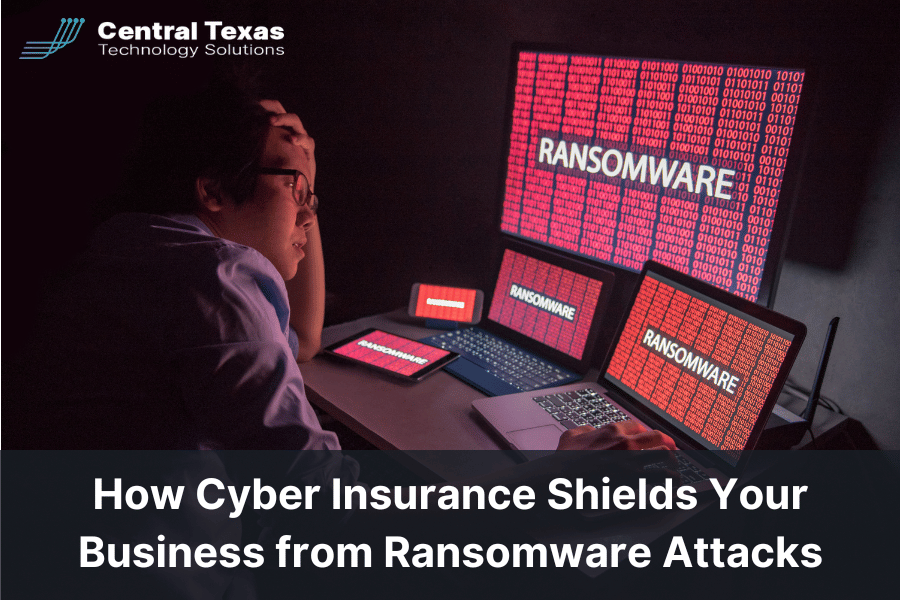
Could Your Business Survive a Ransomware Attack?
Imagine arriving at work, turning on your computer, and seeing a chilling message: your files are locked, and hackers demand a ransom to restore access. Your entire operation grinds to a halt, and you face an agonizing decision—pay the criminals or scramble to recover on your own.
Even if you refuse to pay the ransom, the financial damage can still be devastating. The costs of data recovery, business downtime, legal fees, and reputational harm can quickly add up, threatening your company’s survival. That’s why cyber insurance has become an essential safeguard for businesses of all sizes.
According to research from Sage, 48% of small and midsize enterprises (SMEs) experienced cyberattacks in 2023. If nearly half of all businesses are targeted, the question isn’t if you’ll face an attack—it’s when. The right cyber insurance policy can be the difference between bouncing back and shutting down for good.
What Is Cyber Insurance and How Does It Work?
Cyber insurance is a specialized business policy designed to protect against financial losses caused by cyberattacks, including ransomware. It helps companies recover quickly by covering critical expenses related to an attack.
What Cyber Insurance Typically Covers:
✅ Ransom Payments – If your business chooses to pay the ransom, some policies may reimburse the cost.
✅ Data Recovery – Covers expenses related to restoring lost or compromised files.
✅ Legal Fees & Fines – Helps with legal costs, regulatory penalties, and compliance violations.
✅ Customer Notification – Covers the costs of alerting affected customers and stakeholders.
✅ Business Interruption – Compensates for lost income due to downtime caused by the attack.
✅ Incident Response Services – Many policies include forensic investigations and public relations efforts to protect your reputation.
Cyber insurance doesn’t prevent an attack, but it limits the financial, operational, and reputational damage, allowing businesses to recover with minimal disruption.
How to Get Cyber Insurance That Protects Against Ransomware
Not all cyber insurance policies are created equal, and coverage varies based on your risk profile. To get the right protection, businesses need to assess their specific vulnerabilities.
Factors That Determine Your Cyber Insurance Coverage:
🔹 Business Size & Revenue – Larger businesses with higher revenue may require more extensive coverage.
🔹 Existing Security Measures – Stronger cybersecurity practices can reduce premiums.
🔹 Industry & Data Sensitivity – Healthcare, finance, and other data-sensitive industries often require more coverage.
🔹 Security Incident History – Companies with previous breaches may face higher premiums.
🔹 Geographic Location – Some regions have higher cybercrime risks, impacting policy costs.
Standalone vs. Built-In Cyber Insurance
Many general business liability policies include some level of cyber coverage, but it’s often limited. If your company stores sensitive customer data, processes financial transactions, or operates in a high-risk industry, consider a standalone cyber insurance policy that specifically covers ransomware attacks.
While cyber insurance is an added expense, it’s a strategic investment. Comparing the cost of coverage to the potential financial damage of an attack makes it clear—having cyber insurance is a necessity, not a luxury.
Cyber Insurance: Your Safety Net in a Cyberattack
Cyber insurance won’t stop hackers from targeting your business, but it will drastically reduce the impact of a ransomware attack. The reality is that cybercriminals are constantly evolving, and businesses that lack protection are at the highest risk of suffering irreversible damage.
If you don’t have cyber insurance, now is the time to take action. A policy tailored to your business can provide the critical support and financial backup you need to recover when the worst happens.
FAQs About Cyber Insurance and Ransomware Protection
1. Does cyber insurance always cover ransomware payments?
Not all policies cover ransom payments. Some reimburse the cost if the payment is deemed necessary, while others focus on funding recovery efforts without paying the attackers. Always review the policy details before purchasing coverage.
2. How can I lower my cyber insurance premiums?
Businesses with strong cybersecurity measures—such as multi-factor authentication, regular data backups, and employee training—often qualify for lower premiums. Implementing proactive security strategies can reduce both risks and insurance costs.
3. Is cyber insurance worth it for small businesses?
Absolutely. Small businesses are prime targets for cybercriminals because they often have fewer security resources than large corporations. Cyber insurance ensures you have financial protection and expert assistance in the event of an attack.
Contact CTTS today for IT support and managed services in Austin, TX. Let us handle your IT so you can focus on growing your business. Visit CTTSonline.com or call us at (512) 388-5559 to get started!
